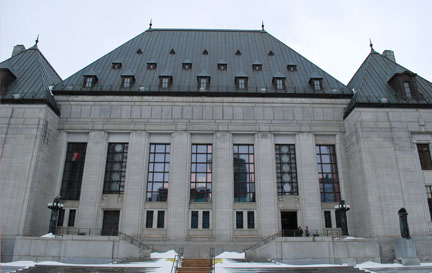The Supreme Court of Canada begins the 2014 winter session with six appeals this week, including the highly anticipated reference on Justice Marc Nadon’s appointment. The court will also be looking at appeals on contract labour law, excessive police force, and the reliability of testimony for sexual assault under intoxication.
 Jan. 13
Jan. 13 — Quebec —
Dionne v. Commission scolaire des PatriotesLabour law: Marilyne Dionne was a casual substitute teacher working for the respondent school board. Dionne was informed by the Commission de la santé et de la sécurité du travail that she qualified for a maternity program. The school board challenged this decision before the Commission des lésions professionnelles, which found Dionne was not an employee, and her contracts lasted only as long as the assignments. The Supreme Court will review whether the Quebec Court of Appeal erred in upholding the CLP’s decision, and whether Dionne was a victim of discrimination.
Read the
Quebec Court of Appeal’s decisionJan. 14 — Federal Court —
Canadian National Railway Co. v. Attorney General of CanadaTransportation law: A confidential contract between CN Rail and Peace River Coal stated that freight rates would be subject to a particular fuel charge. When CN began implementing a new surcharge, Peace River Coal applied to the Canadian Transportation Agency for an order establishing reasonable surcharges under the Canada Transportation Act. CN won a dismissal in the Federal Court on grounds the act had no jurisdiction over confidential contracts. The Federal Court of Appeal overturned that decision. There is a sealing order in this case.
Read the
Federal Court of Appeal’s decisionRelated news articles:
Shippers have right to dispute tariffs and penalties,
Canadian ManufacturingJan. 15 — Canada —
Nadon referenceThe prime minister has referred several questions to the SCC regarding the Supreme Court appointment of Federal Court of Appeal Justice Marc Nadon. Constitutional lawyer Rocco Galati is challenging the appointment based on a strict interpretation of the Supreme Court Act, which does not specifically allow for Supreme Court appointments from the Federal Court. The Parti Quebecois also opposes Nadon as a Quebec representative appointment because he has not lived in the province for years.
Read
Rocco Galati’s notice of application (via
Legal Feeds)
Related news articles:
The Nadon hearings: 10 key issues in the Supreme Court showdown,
The Globe & Mail
Jan. 16 — Ontario —
W.E.B. v. R.Criminal law: The appellant, a convicted sex offender, alleges his trial counsel was incompetent. He argues counsel misrepresented her professional experience in defending such cases, and — despite his instructions — she failed to subpoena witnesses, enter specific material into evidence, and ask specific questions of Crown witnesses. He also argues his counsel refused to permit him to testify. The Ontario Court of Appeal dismissed the applicant’s appeal. The Supreme Court will review whether there was a miscarriage of justice. A publication ban is in place.
Read the
Ontario Court of Appeal’s decisionJan. 17 — Alberta —
Davis v. R.Charter of Rights and Freedoms: Percy Walter Davis was convicted of possessing a weapon for a dangerous purpose and assaulting a police officer. During the incident, Davis charged the officer with a butcher’s knife before walking towards a shopping mall. The officer ordered Davis to drop the knife. Davis failed to comply, and the officer shot him twice. In a majority decision, the Alberta Court of Appeal ruled that, while the trial judge erred in considerations regarding excessive force, the case did not turn on these.
Read the
Alberta Court of Appeal’s decisionRelated news articles:
Man who attacked officer escapes jail,
Edmonton JournalJan. 17 — British Columbia —
James v. CanadaCriminal law: Garry Howard James was acquitted of sexual assault. He and the complainant had consumed alcohol and smoked crack cocaine and were significantly intoxicated. Bruises were found on the thighs, arms, and legs of the complainant, but neither James nor the complainant remember the incident. James told police at the time the complainant had consented to sex. The B.C. Court of Appeal allowed the Crown’s appeal and ordered a new trial.
Read the
British Columbia Court of Appeal’s decisionFor more on the SCC’s winter session read Richard Cleroux’s The Hill column from this week’s Law Times
: "SCC tasked with cleaning Harper’s messes in busy winter session."

 Jan. 13 — Quebec — Dionne v. Commission scolaire des Patriotes
Jan. 13 — Quebec — Dionne v. Commission scolaire des Patriotes